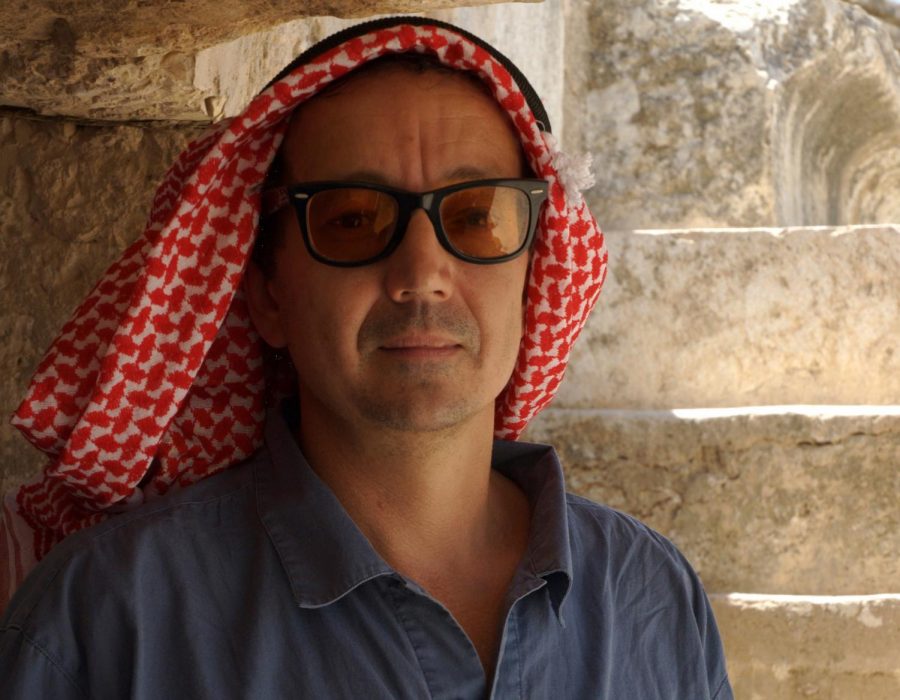UNI professor earns Fulbright to Israel
Professor Philip Hopper has been awarded a 2020 Fulbright Senior Scholar Award to Israel, where he will help to expand a family photo archive.
Oct 10, 2019
UNI Assistant Professor of Digital Media Philip Hopper will be embarking on his second Fulbright experience this spring after receiving the Fulbright Senior Scholar Award to expand on an oral history project located in Israel. During his time there, he will collaborate with Professor Boaz LevTov of Beit Berl College by adding family snapshots and stories to LevTov’s existing Time Tunnels project.
Hopper is one of over 800 U.S. citizens who will teach, conduct research and/or provide expertise abroad for the 2019-2020 academic year through the Fulbright U.S. Scholar Program.
After receiving an M.F.A. from the San Francisco Art Institute in filmmaking, Hopper spent time working as a filmmaker screenwriter, producer, editor and director for various films. Eventually, he began adjunct teaching in New York, which set in motion his passion for education.
His first Fulbright scholarship overseas took place from August 2012 to June 2013, when he traveled to Al-Quds University in West Bank, Jerusalem on a “mixed teaching and research award,” according to Hopper’s website. After the year was complete, Hopper remained at Al-Quds University as a visiting professor until August 2014.
In fall 2013, he began a small archive of family photographs with his students at Al-Quds, when he noticed something interesting. After publishing the site with his class, Hopper saw a spike in the page’s views. In about two weeks, the project had over 4,000 visits.
“A lot of Palestinians have left their home country because of the occupation of the West Bank. There’s a diaspora. In other words, they are spread out all over the world,” said Hopper. “What happened was, students were telling their other family from South America and America and Europe. They were visiting the site to see the stories.”
Upon returning to the United States in August of 2014, Hopper began teaching at UNI. Over the past few years, Hopper has worked on a number of projects involving historical photography and digital archiving. He is actively involved in curating photographs for Fortepan Iowa, a project which collects pictures of moments in Iowa lives from the nineteenth and twentieth centuries.
As he prepares to embark on his second Fulbright experience after five years at UNI, Hopper drew parallels between his 2013 Family Photographs archive and his upcoming collaboration on the Time Tunnel project with Professor LevTov. The project captures the oral histories of Jewish and Palestinian residents of Israel.
Upon his learning of the endeavor, Hopper was excited for the potential of the project.
“I thought to myself, ‘what a great starting point for a family snapshot archive,’” he said.
In the spring, Hopper will be heading to Israel to do just that.
“The main thing I’m going to do while I’m there is try to collect as many family snapshots and their related stories as possible,” Hopper said.
His time in Israel will be spent conducting interviews, digitizing audio of people’s stories and working to expand LevTov’s Time Tunnel project.
According to Hopper, Beit Berl College is situated in a unique area because of the large number of Palestinians who were able to stay there after 1948, when many others were forced out.
“It’s an area called the Triangle, and it includes towns that are majority population Palestinian or Israeli Palestinian,” Hopper said.
The archive is meant to serve as a way to preserve the history and stories of people living in the area, as well as a tool for those wanting to use the material for research purposes.
Hopper seeks to uncover the untold histories of common people.
“The things that everyday photos reveal are very interesting,” Hopper said. “I think that in the past, at least, history has been written about important things and important people and important events. The reality is, that in itself is a very narrow reading of history. A broader reading of history would be the everyday – what people do on an everyday basis.”
Hopper’s work, including the Family Photographs archive project he created with his 2013 students, can be found at philiprahnhopper.net.








